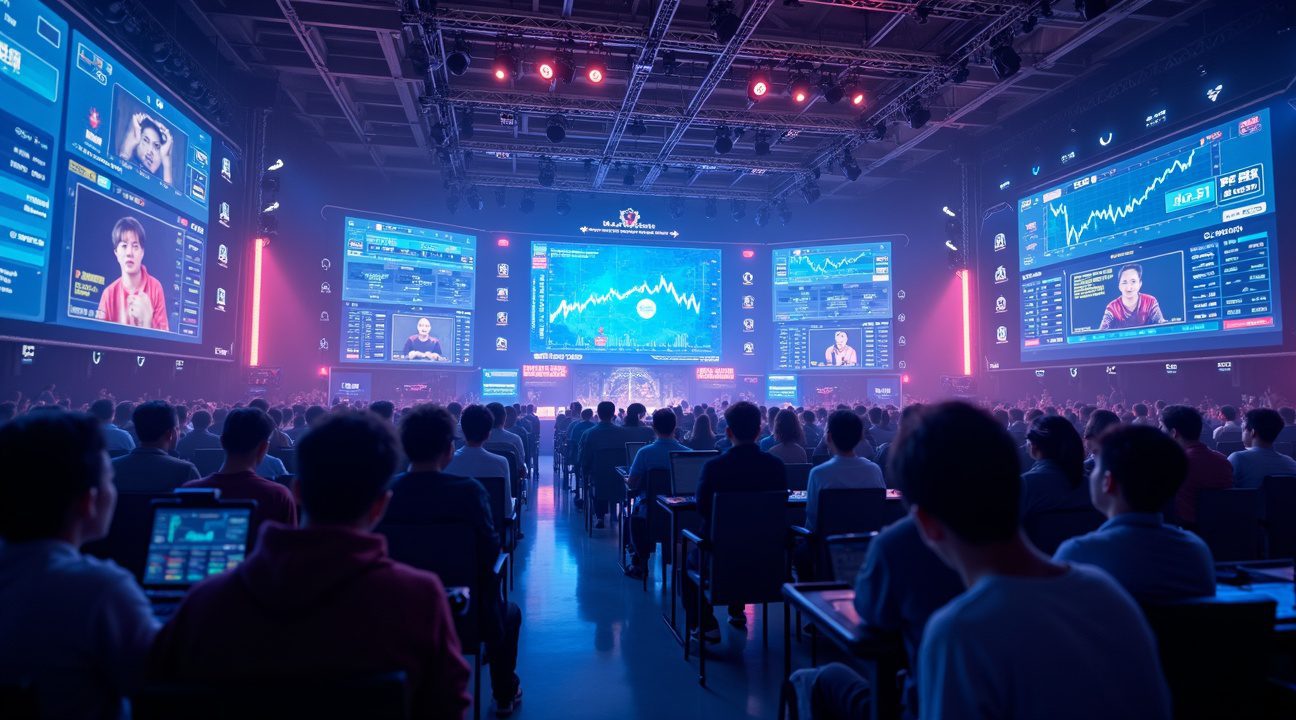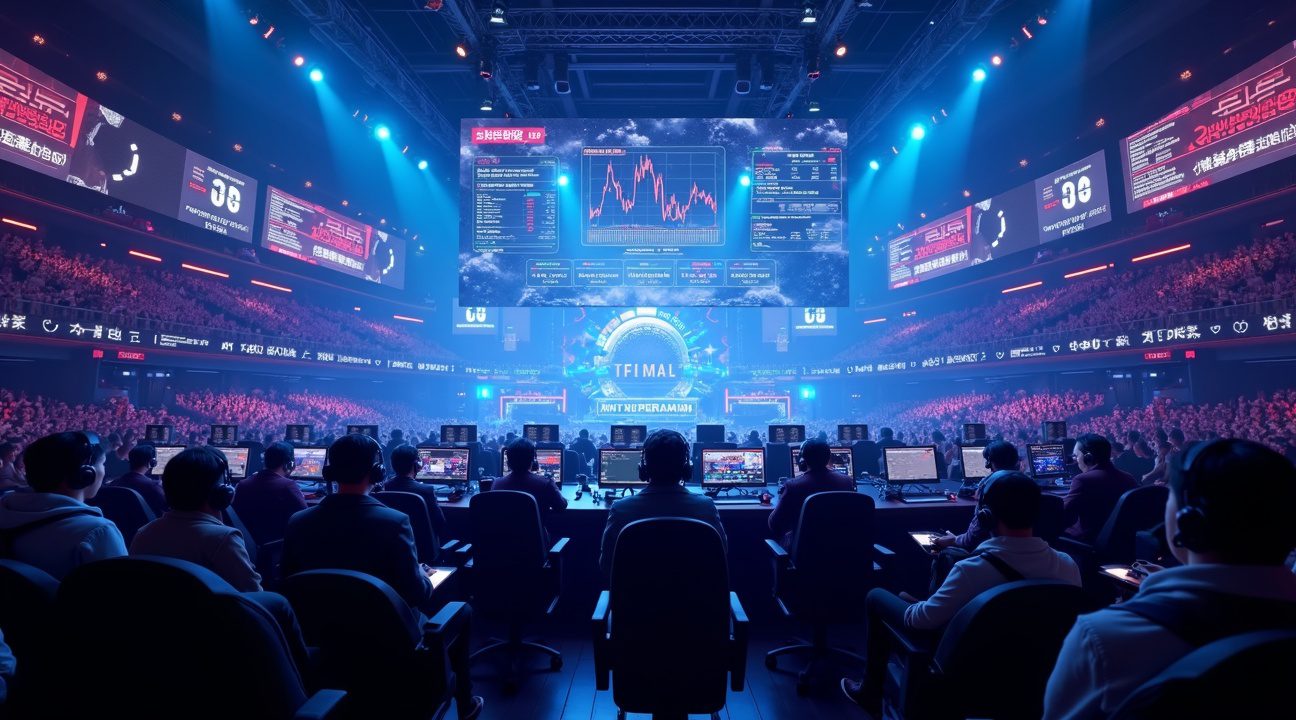South Korea has transformed financial markets by launching proprietary trading tournaments that convert cryptocurrency trading into a competitive spectator sport, complete with live broadcasts, real-time commentary, and e-sports-style competition formats.
This pioneering initiative generated $18.7 million in trading volume on its opening day, clearly demonstrating a robust market interest for this innovative blend of finance and entertainment.
Key Takeaways
- Real Capital Trading: South Korea’s crypto trading tournaments feature live, capital-backed trading in timed environments with full transparency, allowing the audience to observe every trading decision and strategy unfold in real time.
- Generation Z and Millennials Influence: The 18-34 age group—making up 71% of global blockchain gamers—accelerates adoption by engaging with crypto as a gamified form of finance within familiar e-sports-style competitive structures.
- Asia-Pacific Blockchain Gaming Dominance: This region leads the global blockchain gaming arena with 47% market share. South Korea’s own e-sports sector is on track to generate $321.3 million in revenue by 2025, with projections of over 12.2 million users by 2029.
- Regulatory Compliance: These tournaments are crafted to operate within a legal environment that delineates them from restricted blockchain gaming, focusing on real trading activity and financial literacy over pure game mechanics.
- Massive Growth Potential: This convergence of finance and gaming represents an estimated $90 billion investment opportunity by 2025, backed by a user base of 896 million and an anticipated $5.9 billion in global gaming revenue. South Korea is positioned to lead in this new wave of financial technology entertainment.
For more context on South Korea’s forward-thinking approach to blending finance with interactive entertainment, visit this CoinDesk article covering recent developments in the space.
Live-Streamed Trading Tournaments Transform Finance Into Spectator Sport
South Korea revolutionized financial markets on September 24, 2025, when it launched proprietary trading tournaments that mirror e-sports competitions. These groundbreaking events feature participants trading real capital in timed environments while audiences watch every move unfold through live broadcasts. Unlike traditional trading that happens behind closed doors, these tournaments expose every decision, strategy, and outcome to public scrutiny.
Real-Time Transparency Builds Market Confidence
The tournament format prioritizes transparency through real-time displays of trading strategies and performance metrics. Viewers can observe each participant’s approach as trades execute, creating an unprecedented level of openness in financial markets. Professional commentators analyze moves and explain complex strategies, making sophisticated trading concepts accessible to general audiences. This visibility directly addresses concerns about market manipulation by ensuring trades occur in full view of spectators and regulatory oversight.
The format’s emphasis on skill-based competition elevates trading from mere speculation to recognized expertise. Participants demonstrate their analytical abilities, risk management skills, and market intuition under pressure, similar to how athletes perform in high-stakes competitions. Commentary teams break down technical analysis, market sentiment, and strategic thinking in real-time, educating viewers while entertaining them.
Market response to this innovative approach exceeded expectations, with opening day generating $18.7 million in trading volume. Tokens like Pinkfong captured significant attention, demonstrating strong appetite for this new competitive format. Early participation rates indicate traders embrace the opportunity to showcase their skills publicly while competing for prizes and recognition.
This initiative fundamentally shifts finance from its traditionally private nature toward an open, competitive model that treats trading as a spectator sport. Professional traders can now build personal brands and followings, similar to how gamers develop audiences in e-sports. The format democratizes financial education by making expert-level trading visible and comprehensible to broader audiences.
South Korea’s crypto trading e-sport represents a paradigm shift that could influence global financial markets. By combining entertainment value with educational content, these tournaments create new pathways for public engagement with finance. The format’s success may inspire other nations to adopt similar approaches, potentially transforming how people perceive and participate in financial markets.
The competitive structure introduces performance metrics that extend beyond simple profit margins. Participants compete on:
- Risk-adjusted returns
- Consistency
- Strategic innovation
This comprehensive assessment approach ensures the most skilled traders receive recognition rather than just the luckiest ones.
Gaming Generation Drives New Financial Entertainment Model
I’ve observed how South Korea’s crypto trading competitions deliberately target young, tech-savvy traders by merging gaming dynamics with high-stakes finance. These events replicate essential e-sports elements like leaderboards, live commentary, and audience participation features that resonate deeply with the gaming generation.
This strategic approach aims to inspire greater participation in domestic financial markets by speaking the language that younger demographics understand best. The main demographic driving both e-sports and crypto adoption consists of individuals aged 18–34, who account for 71% of blockchain gamers globally. This group perceives crypto as gamified finance and recognizes e-sports as legitimate investment opportunities rather than mere entertainment.
Digital Infrastructure Powers Real-Time Engagement
South Korea’s video game and e-sports user base draws heavily from Generation Z and millennials, who utilize gaming for both entertainment and socialization. These users gravitate toward multiplayer, interactive formats that mirror the collaborative and competitive nature of crypto trading events. I can see how this preference aligns perfectly with the structure of crypto trading competitions that emphasize real-time interaction and community engagement.
The rapid adoption of this financial entertainment model benefits significantly from South Korea’s advanced 5G digital infrastructure. This technological foundation makes high-frequency online participation and live streaming highly accessible, removing traditional barriers that might prevent younger users from engaging with financial markets. The seamless connectivity allows traders to participate in competitions from anywhere while maintaining the low-latency requirements essential for both gaming and trading success.
By transforming crypto trading into an entertainment spectacle, South Korea creates an environment where financial literacy develops naturally through gamification. Young traders learn market dynamics, risk management, and strategic thinking while enjoying the competitive rush they associate with their favorite e-sports titles. This approach transforms what traditionally feels like intimidating financial territory into familiar gaming ground where they already possess confidence and skills.
The integration of social elements further amplifies engagement, as participants can build communities around trading strategies and market insights. These competitions foster the same type of team-building and knowledge sharing that characterizes successful gaming communities, creating sustainable engagement that extends beyond individual events.

South Korea Leads Massive Global Market Convergence
I’ve witnessed an extraordinary transformation as cryptocurrency trading and e-sports merge into a powerful economic force. This convergence represents a substantial $90 billion investment opportunity by 2025, supported by 896 million users and a predicted $5.9 billion in global gaming revenue. South Korea stands at the forefront of this revolution, driving innovation in gamified financial products.
Asia-Pacific Dominates the Blockchain Gaming Revolution
Asia-Pacific commands the blockchain gaming landscape with an impressive 47% market share. This regional dominance reflects sophisticated gaming infrastructure and widespread cryptocurrency adoption. I observe that South Korea contributes significantly to this leadership position through its exceptional e-sports expertise and pioneering approaches to crypto trading platforms.
The numbers speak volumes about South Korea’s market position. The country’s esports market revenue is projected at $321.3 million in 2025, with over 12.2 million users expected by 2029. User penetration reaches 21.1% in 2025, demonstrating remarkable market maturity despite the nation’s relatively small population.
Elite Performance Drives Market Innovation
South Korea’s competitive excellence extends far beyond traditional metrics. Despite representing a fraction of the global population, the country accounts for 11% of all top-tier tournament wins globally. This exceptional performance ratio showcases the depth of talent and strategic thinking that Korean players bring to competitive gaming.
I find this success particularly relevant to cryptocurrency trading platforms because it demonstrates the same analytical skills, quick decision-making, and risk management abilities that define successful traders. Korean gamers’ proven track record in high-stakes competitions translates directly into sophisticated trading behaviors and platform preferences.
The convergence benefits from South Korea’s unique position as both an e-sports powerhouse and a technologically advanced economy. Korean developers understand competitive gaming psychology better than most global counterparts. They create platforms that satisfy both entertainment and investment objectives.
Market leadership in this space requires understanding how competitive gaming mentality applies to financial markets. Korean companies excel at creating engaging user experiences that maintain the thrill of competition while providing serious investment opportunities. This combination attracts both seasoned traders seeking new platforms and gaming enthusiasts exploring cryptocurrency markets.
The projected growth figures reflect South Korea’s capacity to influence global trends. As user bases expand and revenue streams diversify, Korean innovations in gamified trading platforms will likely shape industry standards worldwide. This influence extends beyond domestic markets, positioning South Korea as a key driver of international cryptocurrency and gaming convergence.
Digital Innovation Meets Strong Market Growth Projections
South Korea’s video game market demonstrates exceptional momentum, with projections indicating growth at a CAGR of 8.40% from 2025 to 2034. This remarkable expansion provides the perfect foundation for the country’s latest innovation: transforming crypto trading into competitive e-sports. The integration reflects South Korea’s commitment to digital advancement and its ability to leverage world-class technological infrastructure for groundbreaking applications.
The nation’s tech-forward approach has created an environment where traditional boundaries between gaming and financial technology blur. Korean developers and tournament organizers recognize that crypto trading competitions tap into the same competitive instincts that drive traditional e-sports success. Players demonstrate split-second decision-making skills, risk assessment abilities, and strategic thinking that translate perfectly from conventional gaming tournaments to cryptocurrency markets.
Virtual Reality and Metaverse Gaming Drive Consumer Engagement
Consumer preferences increasingly favor immersive experiences, driving the rise of VR and metaverse games throughout South Korea. This shift creates natural synergies with crypto trading competitions, where participants can engage in virtual trading environments that simulate real market conditions. VR tournaments continue to increase in both number and popularity, establishing new formats for competitive events.
The immersive nature of VR technology enhances the spectator experience for crypto trading competitions. Viewers can observe trading decisions in real-time through enhanced visual interfaces that display market data, trading positions, and competitor strategies simultaneously. These technological capabilities position South Korea at the forefront of next-generation competitive gaming formats.
Global E-sports Market Positioning and Revenue Potential
Esports viewership is expected to surpass 640 million globally in 2025, creating massive audience potential for innovative competition formats. South Korea, China, and the US together contribute to more than 50% of global esports revenues, placing Korean crypto trading tournaments in a prime position to capture significant market share. The country’s established e-sports infrastructure provides immediate advantages for organizing and broadcasting these new competition types.
Korea Blockchain Week exemplifies this trend, where similar perpetual trading tournaments attracted substantial attention from both Web3 enthusiasts and traditional gamers. These events demonstrate that crypto trading competitions can successfully bridge different audience segments, creating new revenue streams and engagement opportunities. Tournament organizers have discovered that crypto trading competitions generate excitement levels comparable to traditional gaming championships.
The financial incentives align perfectly with South Korea’s competitive gaming culture. Prize pools for crypto trading tournaments can fluctuate based on market performance, creating dynamic reward structures that maintain participant interest throughout extended competition periods. Sponsors from both gaming and financial sectors recognize the marketing potential of these hybrid events, leading to increased investment in tournament infrastructure and prize money.
Broadcasting partnerships have emerged between traditional e-sports networks and cryptocurrency exchanges, creating new distribution channels for these competitions. Viewers can follow their favorite traders across multiple platforms while accessing real-time market analysis and educational content. The educational component proves particularly valuable for audiences interested in learning trading strategies through competitive demonstration.
South Korea’s regulatory framework supports this innovation by providing clear guidelines for cryptocurrency competitions while maintaining consumer protections. Tournament organizers can operate with confidence, knowing that their events comply with local financial regulations and gaming standards. This regulatory clarity encourages international participants and sponsors to engage with Korean-hosted competitions.
The success of these initiatives positions South Korea as a leader in financial technology entertainment. Other countries observe Korean crypto trading tournaments as potential models for their own markets, creating opportunities for Korean companies to export their expertise and technology platforms. The convergence of gaming culture, financial innovation, and technological infrastructure creates a unique competitive advantage that extends beyond domestic markets.
https://www.youtube.com/watch?v=z1aJFeM9xjA
Regulatory Navigation and Legal Framework Challenges
South Korea’s crypto trading tournaments operate within a carefully crafted legal framework that distinguishes them from prohibited blockchain gaming activities. While blockchain-based play-to-earn games involving cryptocurrency rewards remain technically illegal under current regulations, these prop trading competitions leverage a different legal structure that allows participants to compete with real capital.
Legal Structure and Compliance Framework
The tournaments sidestep regulatory restrictions by focusing on legitimate trading activities rather than gaming mechanics. I’ve observed how organizers structure these events as educational and competitive trading platforms, where participants demonstrate their market analysis skills using actual trading capital. This approach ensures compliance with financial regulations while maintaining the competitive entertainment value that audiences expect.
Key aspects of the legal framework include:
- Clear separation from gaming regulations through emphasis on financial education and skill development
- Transparency requirements that exceed traditional trading platforms
- Participant verification processes that align with anti-money laundering standards
- Real-time disclosure of trading positions and performance metrics
- Structured oversight that mirrors traditional financial competitions
The transparency mandate creates an environment where every trade, strategy decision, and market position becomes visible to both participants and spectators. This level of openness not only satisfies regulatory requirements but also enhances the entertainment value for viewers who can follow along with professional-level trading decisions in real-time.
International investors and e-sports organizations are taking notice of this innovative approach. The model successfully bridges the gap between financial markets and competitive entertainment without triggering the regulatory concerns that have hampered cryptocurrency gaming initiatives. South Korea’s transformation of crypto trading into a spectator sport represents a significant shift in how financial competitions can be structured legally and commercially.
This regulatory innovation positions South Korea at the forefront of a potentially transformative trend where entertainment, investment, and technology converge. The emphasis on competitive talent development and audience engagement creates a sustainable model that could influence similar initiatives globally. By maintaining strict compliance standards while fostering innovation, these tournaments demonstrate how emerging technologies can be integrated into existing regulatory frameworks without compromising consumer protection or market integrity.
The success of this approach may encourage other jurisdictions to develop similar frameworks, potentially creating a new category of regulated financial entertainment that combines the excitement of e-sports with the sophistication of professional trading.

Investment Risks and Cross-Market Opportunities
Risk Factors in Gaming-Finance Integration
The convergence of entertainment and investment through crypto trading e-sports creates compelling opportunities but carries significant risks. Regulatory authorities increasingly scrutinize esports betting activities, particularly when crypto assets are involved. Token price volatility presents another challenge, with cryptocurrencies like $SOL and $DOGE experiencing dramatic swings that can amplify both gains and losses for participants.
I observe that this fusion may attract substantial new capital flows, yet it exposes participants to reputational risks if gaming platforms become associated with financial speculation rather than skill-based competition. Traditional financial regulations weren’t designed for this hybrid model, creating uncertainty about compliance requirements and potential regulatory shifts.
Emerging Market Opportunities
Cross-asset synergies present significant opportunities for forward-thinking investors and institutions. Crypto infrastructure companies can tap into growing demand for tournament platforms that handle both gaming rewards and financial transactions. I expect financial product developers to create new instruments that bridge traditional markets with gaming ecosystems.
Audience monetization strategies extend beyond typical advertising models through tokenized reward systems and participation incentives. Key performance indicators to monitor include:
- Participation rates across different demographic segments
- Tournament audience growth and engagement metrics
- Trading volume milestones during competitive events
- Adoption rates of tokenized reward models
- Cross-platform integration success rates
International attention focuses on South Korea’s innovative approach, potentially establishing it as a template for other markets. Institutional crypto flows may increase as major financial players recognize the legitimacy and scale of competitive trading events. I anticipate that successful implementation could trigger similar initiatives in markets like Japan, Singapore, and select European jurisdictions.
The infrastructure requirements for supporting crypto trading competitions create investment opportunities in blockchain scalability solutions, security protocols, and user interface development. Companies positioned at the intersection of gaming technology and financial services stand to benefit from this emerging sector.
Cross-market expansion depends on regulatory acceptance and technological readiness in target jurisdictions. Early movers in developing compliant frameworks for crypto-gaming integration may establish competitive advantages as this model spreads globally.
Sources:
MevX Blog: “South Korea Launches E-Sports Style Prop Trading Tournaments”
AInvest: “The Synergy of Esports and Cryptocurrency: A New Frontier for High-Growth Stocks”
SQ Magazine: “Esports Statistics 2025: Market Growth, Viewership, and Trends”
Statista: “Esports – South Korea | Statista Market Forecast”
Expert Market Research: “South Korea Video Game Market Size, Share & Report 2034”

